Abstract
There is a crisis in the patient-physician relationship. Mass media, managed care and malpractice are just a few factors that contribute to a lack of trust, understanding and loyalty in the patient-physician relationship. We have experienced some select concepts within the Society, Culture and Personality (SCP) model. In it, we explore how social class, age, race, ethnicity and family background of the patient impact upon the patient-physician relationships. The analysis of the sick role is most prominent, and in this interactive process empathy must be given to each person who seeks medical help.
Full text
PDF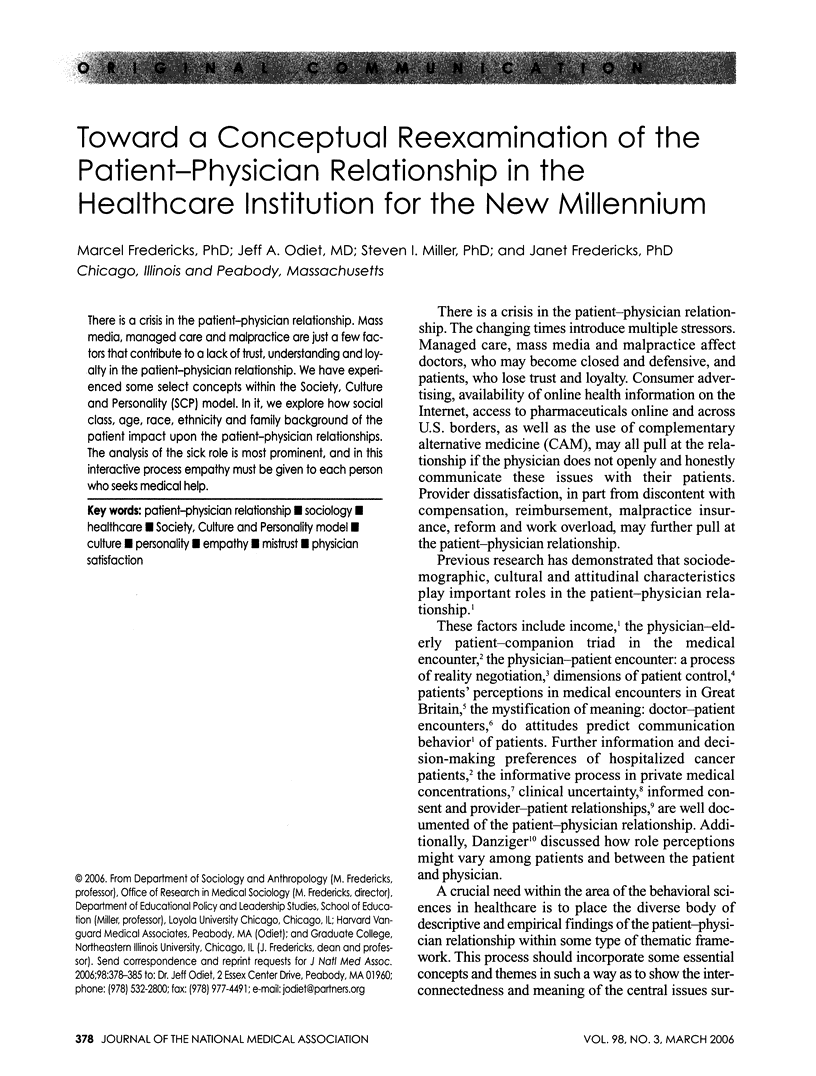
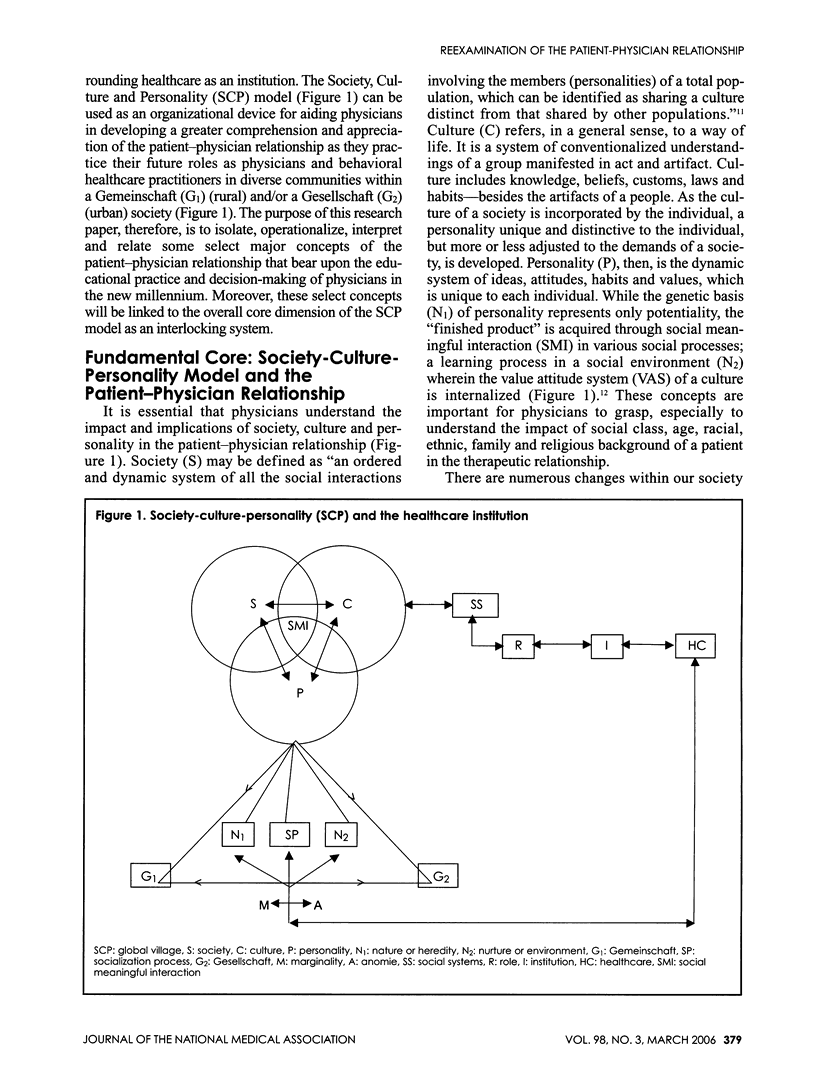
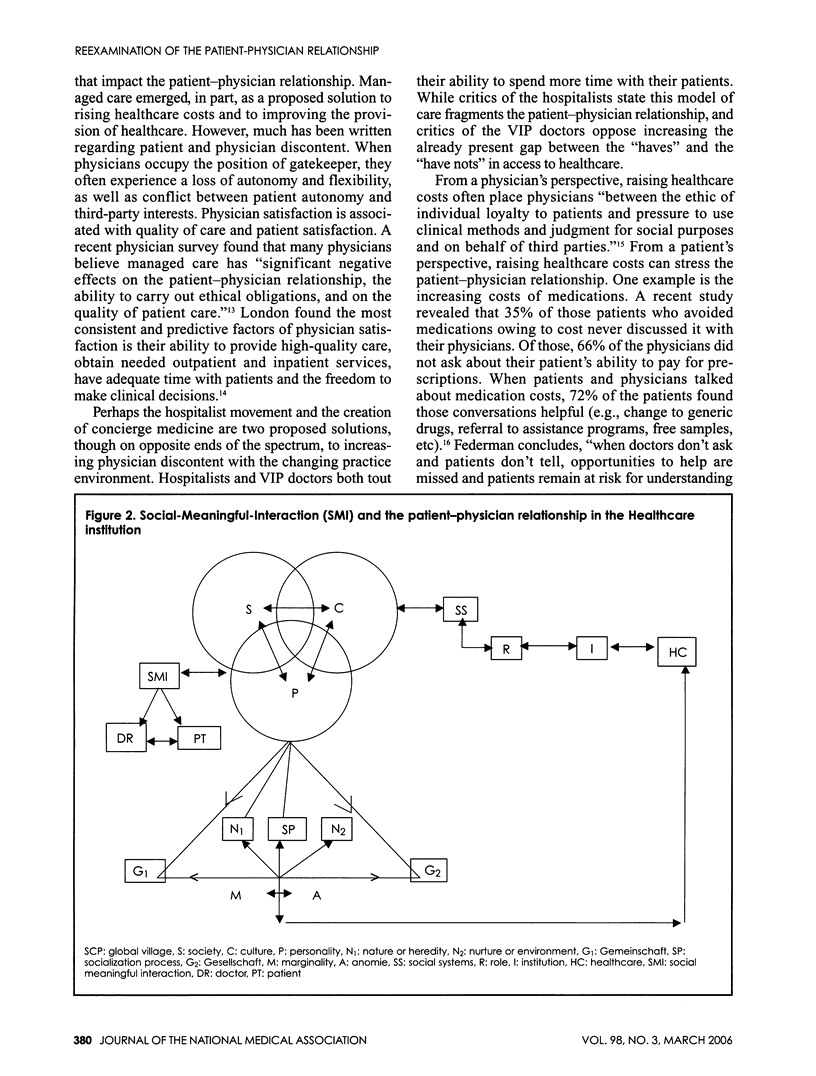
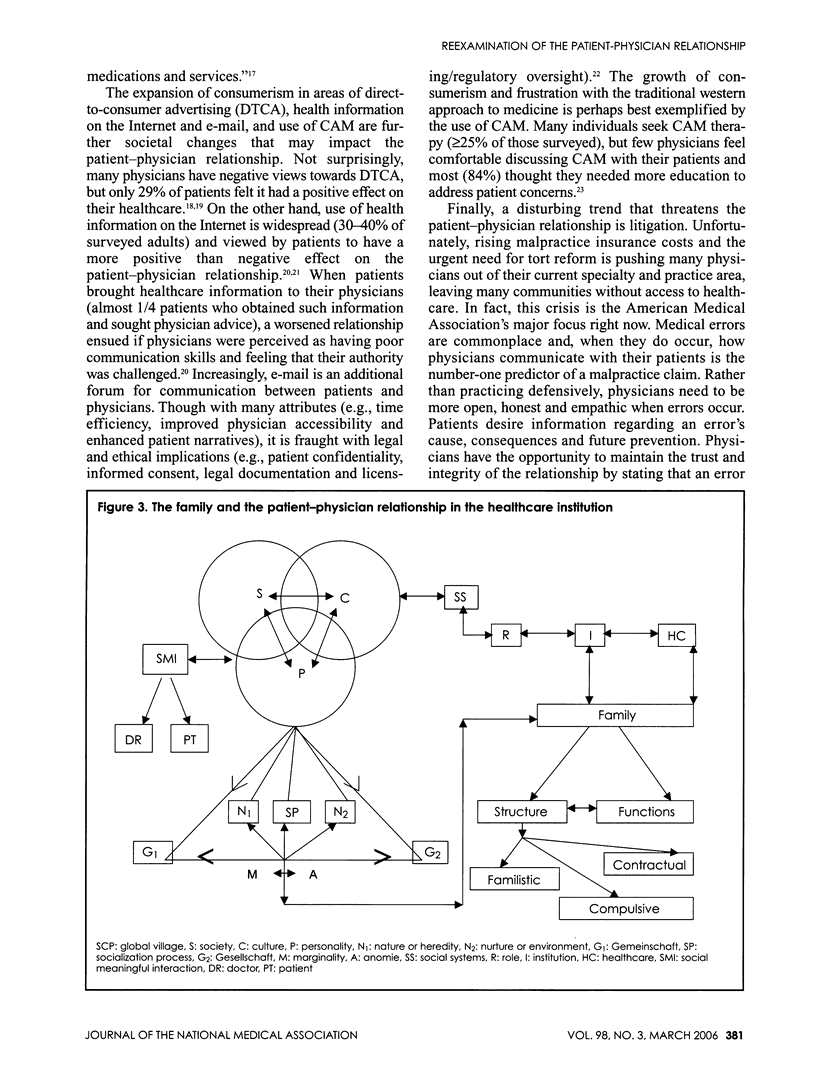
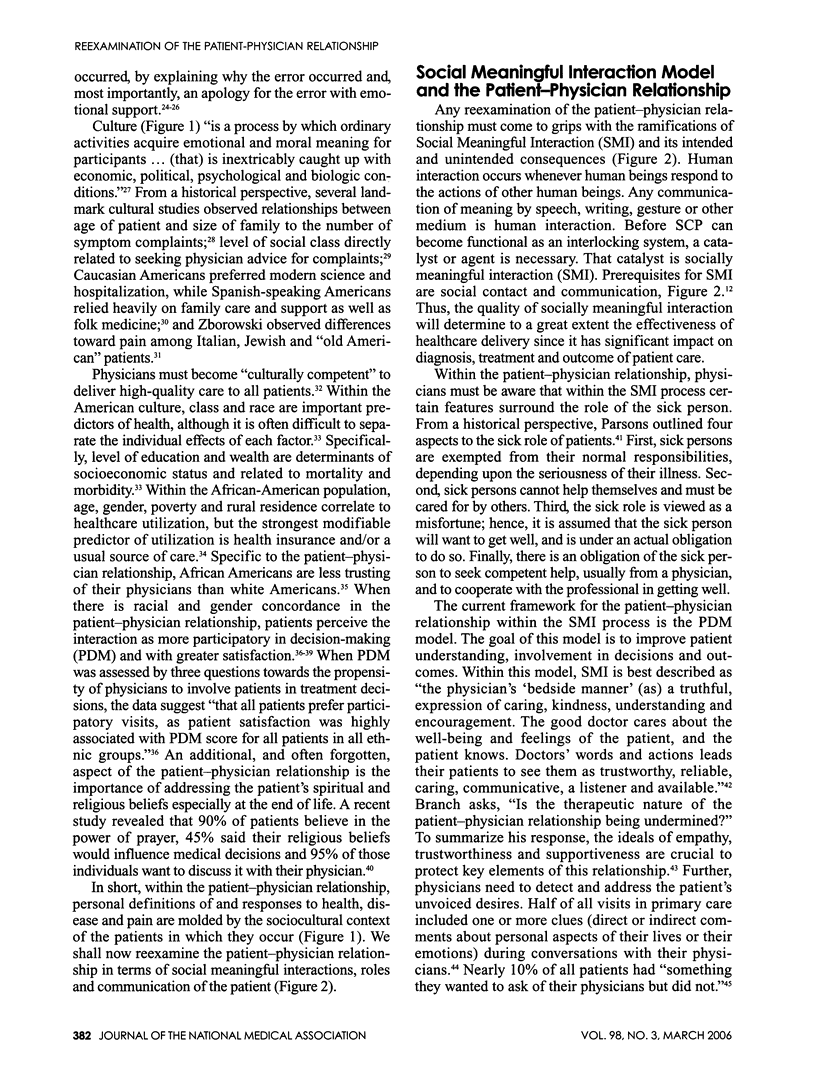
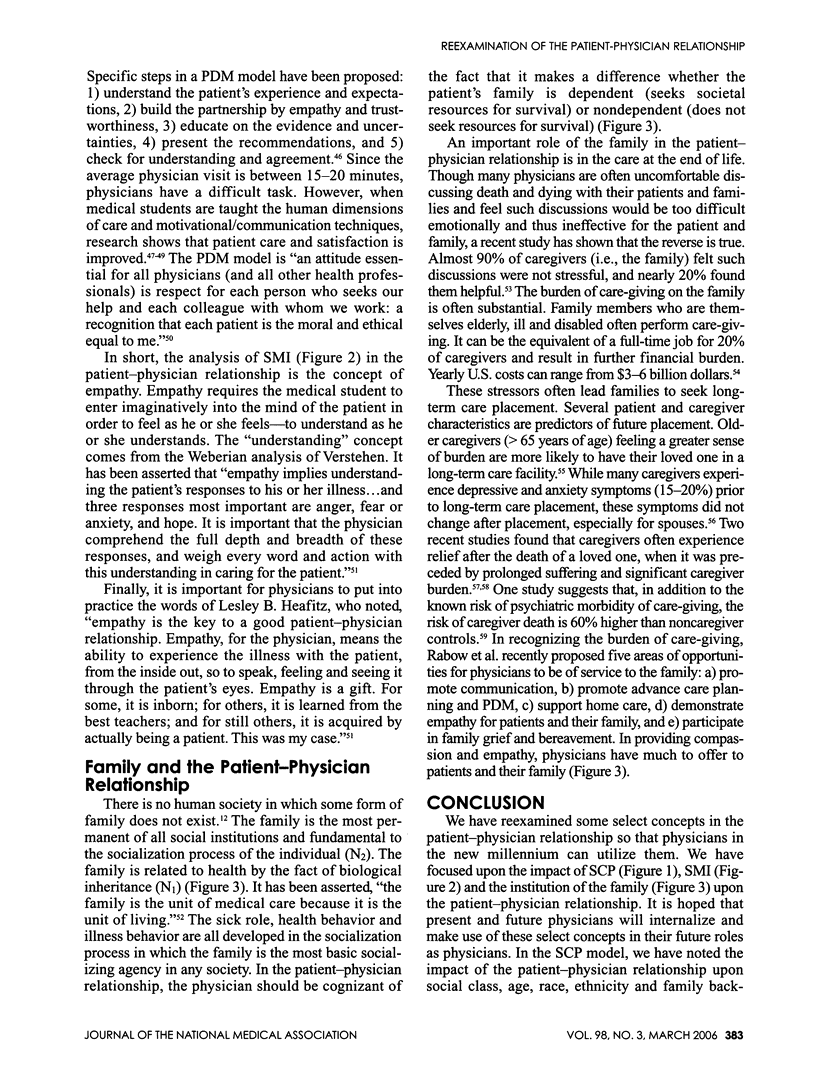
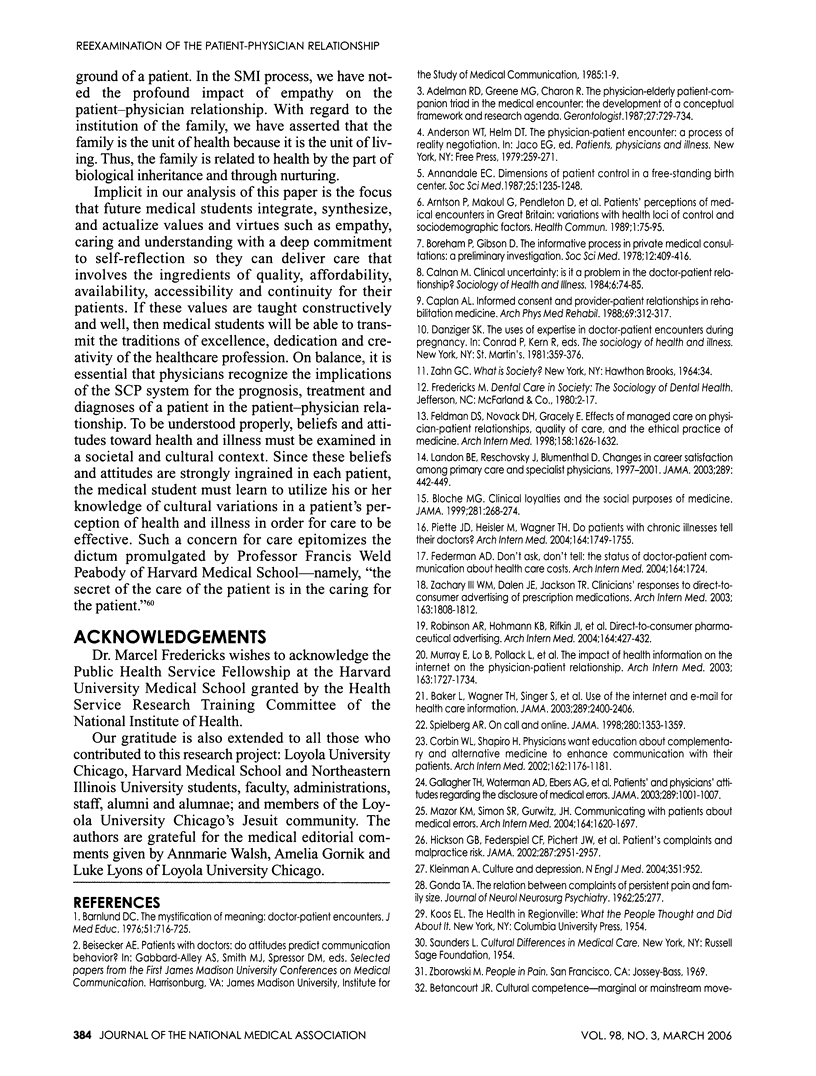
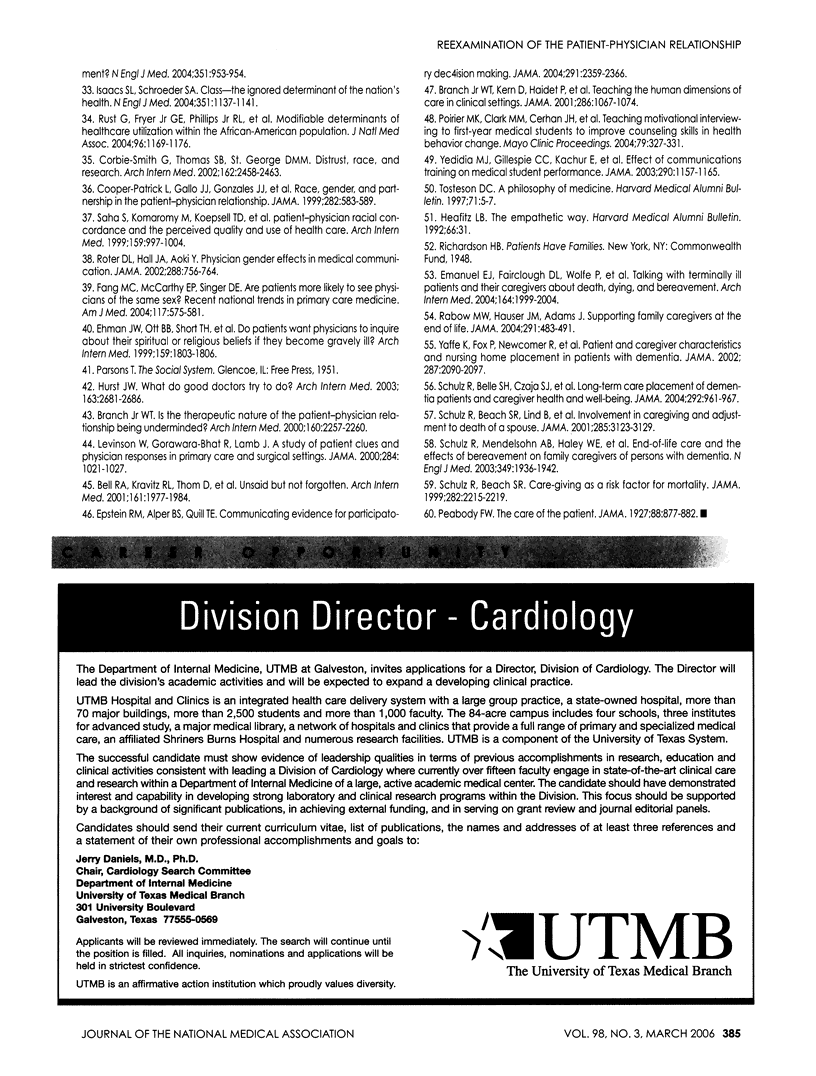
Selected References
These references are in PubMed. This may not be the complete list of references from this article.
- Adelman R. D., Greene M. G., Charon R. The physician-elderly patient-companion triad in the medical encounter: the development of a conceptual framework and research agenda. Gerontologist. 1987 Dec;27(6):729–734. doi: 10.1093/geront/27.6.729. [DOI] [PubMed] [Google Scholar]
- Baker Laurence, Wagner Todd H., Singer Sara, Bundorf M. Kate. Use of the Internet and e-mail for health care information: results from a national survey. JAMA. 2003 May 14;289(18):2400–2406. doi: 10.1001/jama.289.18.2400. [DOI] [PubMed] [Google Scholar]
- Barnlund D. C. The mystification of meaning: doctor-patient encounters. J Med Educ. 1976 Sep;51(09):716–725. doi: 10.1097/00001888-197609000-00002. [DOI] [PubMed] [Google Scholar]
- Bell R. A., Kravitz R. L., Thom D., Krupat E., Azari R. Unsaid but not forgotten: patients' unvoiced desires in office visits. Arch Intern Med. 2001 Sep 10;161(16):1977–1984. doi: 10.1001/archinte.161.16.1977. [DOI] [PubMed] [Google Scholar]
- Bloche M. G. Clinical loyalties and the social purposes of medicine. JAMA. 1999 Jan 20;281(3):268–274. doi: 10.1001/jama.281.3.268. [DOI] [PubMed] [Google Scholar]
- Boreham P., Gibson D. The informative process in private medical consultations: a preliminary investigation. Soc Sci Med. 1978 Sep;12(5A):409–416. [PubMed] [Google Scholar]
- Branch W. T., Jr Is the therapeutic nature of the patient-physician relationship being undermined? A primary care physician's perspective. Arch Intern Med. 2000 Aug 14;160(15):2257–2260. doi: 10.1001/archinte.160.15.2257. [DOI] [PubMed] [Google Scholar]
- Branch W. T., Jr, Kern D., Haidet P., Weissmann P., Gracey C. F., Mitchell G., Inui T. The patient-physician relationship. Teaching the human dimensions of care in clinical settings. JAMA. 2001 Sep 5;286(9):1067–1074. doi: 10.1001/jama.286.9.1067. [DOI] [PubMed] [Google Scholar]
- Caplan A. L. Informed consent and provider-patient relationships in rehabilitation medicine. Arch Phys Med Rehabil. 1988 May;69(5):312–317. [PubMed] [Google Scholar]
- Cooper-Patrick L., Gallo J. J., Gonzales J. J., Vu H. T., Powe N. R., Nelson C., Ford D. E. Race, gender, and partnership in the patient-physician relationship. JAMA. 1999 Aug 11;282(6):583–589. doi: 10.1001/jama.282.6.583. [DOI] [PubMed] [Google Scholar]
- Corbie-Smith Giselle, Thomas Stephen B., St George Diane Marie M. Distrust, race, and research. Arch Intern Med. 2002 Nov 25;162(21):2458–2463. doi: 10.1001/archinte.162.21.2458. [DOI] [PubMed] [Google Scholar]
- Corbin Winslow Lisa, Shapiro Howard. Physicians want education about complementary and alternative medicine to enhance communication with their patients. Arch Intern Med. 2002 May 27;162(10):1176–1181. doi: 10.1001/archinte.162.10.1176. [DOI] [PubMed] [Google Scholar]
- Ehman J. W., Ott B. B., Short T. H., Ciampa R. C., Hansen-Flaschen J. Do patients want physicians to inquire about their spiritual or religious beliefs if they become gravely ill? Arch Intern Med. 1999 Aug 9;159(15):1803–1806. doi: 10.1001/archinte.159.15.1803. [DOI] [PubMed] [Google Scholar]
- Emanuel Ezekiel J., Fairclough Diane L., Wolfe Pam, Emanuel Linda L. Talking with terminally ill patients and their caregivers about death, dying, and bereavement: is it stressful? Is it helpful? Arch Intern Med. 2004 Oct 11;164(18):1999–2004. doi: 10.1001/archinte.164.18.1999. [DOI] [PubMed] [Google Scholar]
- Epstein Ronald M., Alper Brian S., Quill Timothy E. Communicating evidence for participatory decision making. JAMA. 2004 May 19;291(19):2359–2366. doi: 10.1001/jama.291.19.2359. [DOI] [PubMed] [Google Scholar]
- Fang Margaret C., McCarthy Ellen P., Singer Daniel E. Are patients more likely to see physicians of the same sex? Recent national trends in primary care medicine. Am J Med. 2004 Oct 15;117(8):575–581. doi: 10.1016/j.amjmed.2004.03.043. [DOI] [PubMed] [Google Scholar]
- Federman Alex D. Don't ask, don't tell: the status of doctor-patient communication about health care costs. Arch Intern Med. 2004 Sep 13;164(16):1723–1724. doi: 10.1001/archinte.164.16.1723. [DOI] [PubMed] [Google Scholar]
- Feldman D. S., Novack D. H., Gracely E. Effects of managed care on physician-patient relationships, quality of care, and the ethical practice of medicine: a physician survey. Arch Intern Med. 1998 Aug 10;158(15):1626–1632. doi: 10.1001/archinte.158.15.1626. [DOI] [PubMed] [Google Scholar]
- GONDA T. A. The relation between complaints of persistent pain and family size. J Neurol Neurosurg Psychiatry. 1962 Aug;25:277–281. doi: 10.1136/jnnp.25.3.277. [DOI] [PMC free article] [PubMed] [Google Scholar]
- Gallagher Thomas H., Waterman Amy D., Ebers Alison G., Fraser Victoria J., Levinson Wendy. Patients' and physicians' attitudes regarding the disclosure of medical errors. JAMA. 2003 Feb 26;289(8):1001–1007. doi: 10.1001/jama.289.8.1001. [DOI] [PubMed] [Google Scholar]
- Hickson Gerald B., Federspiel Charles F., Pichert James W., Miller Cynthia S., Gauld-Jaeger Jean, Bost Preston. Patient complaints and malpractice risk. JAMA. 2002 Jun 12;287(22):2951–2957. doi: 10.1001/jama.287.22.2951. [DOI] [PubMed] [Google Scholar]
- Hurst J. Willis. What do good doctors try to do? Arch Intern Med. 2003 Dec 8;163(22):2681–2686. doi: 10.1001/archinte.163.22.2681. [DOI] [PubMed] [Google Scholar]
- Isaacs Stephen L., Schroeder Steven A. Class - the ignored determinant of the nation's health. N Engl J Med. 2004 Sep 9;351(11):1137–1142. doi: 10.1056/NEJMsb040329. [DOI] [PubMed] [Google Scholar]
- Landon Bruce E., Reschovsky James, Blumenthal David. Changes in career satisfaction among primary care and specialist physicians, 1997-2001. JAMA. 2003 Jan 22;289(4):442–449. doi: 10.1001/jama.289.4.442. [DOI] [PubMed] [Google Scholar]
- Levinson W., Gorawara-Bhat R., Lamb J. A study of patient clues and physician responses in primary care and surgical settings. JAMA. 2000 Aug 23;284(8):1021–1027. doi: 10.1001/jama.284.8.1021. [DOI] [PubMed] [Google Scholar]
- Mazor Kathleen M., Simon Steven R., Gurwitz Jerry H. Communicating with patients about medical errors: a review of the literature. Arch Intern Med. 2004 Aug 9;164(15):1690–1697. doi: 10.1001/archinte.164.15.1690. [DOI] [PubMed] [Google Scholar]
- Murray Elizabeth, Lo Bernard, Pollack Lance, Donelan Karen, Catania Joe, White Martha, Zapert Kinga, Turner Rachel. The impact of health information on the internet on the physician-patient relationship: patient perceptions. Arch Intern Med. 2003 Jul 28;163(14):1727–1734. doi: 10.1001/archinte.163.14.1727. [DOI] [PubMed] [Google Scholar]
- Piette John D., Heisler Michele, Wagner Todd H. Cost-related medication underuse: do patients with chronic illnesses tell their doctors? Arch Intern Med. 2004 Sep 13;164(16):1749–1755. doi: 10.1001/archinte.164.16.1749. [DOI] [PubMed] [Google Scholar]
- Poirier Maria K., Clark Matthew M., Cerhan Jane H., Pruthi Sandhya, Geda Yonas E., Dale Lowell C. Teaching motivational interviewing to first-year medical students to improve counseling skills in health behavior change. Mayo Clin Proc. 2004 Mar;79(3):327–331. doi: 10.4065/79.3.327. [DOI] [PubMed] [Google Scholar]
- Rabow Michael W., Hauser Joshua M., Adams Jocelia. Supporting family caregivers at the end of life: "they don't know what they don't know". JAMA. 2004 Jan 28;291(4):483–491. doi: 10.1001/jama.291.4.483. [DOI] [PubMed] [Google Scholar]
- Robinson Andrew R., Hohmann Kirsten B., Rifkin Julie I., Topp Daniel, Gilroy Christine M., Pickard Jeffrey A., Anderson Robert J. Direct-to-consumer pharmaceutical advertising: physician and public opinion and potential effects on the physician-patient relationship. Arch Intern Med. 2004 Feb 23;164(4):427–432. doi: 10.1001/archinte.164.4.427. [DOI] [PubMed] [Google Scholar]
- Roter Debra L., Hall Judith A., Aoki Yutaka. Physician gender effects in medical communication: a meta-analytic review. JAMA. 2002 Aug 14;288(6):756–764. doi: 10.1001/jama.288.6.756. [DOI] [PubMed] [Google Scholar]
- Saha S., Komaromy M., Koepsell T. D., Bindman A. B. Patient-physician racial concordance and the perceived quality and use of health care. Arch Intern Med. 1999 May 10;159(9):997–1004. doi: 10.1001/archinte.159.9.997. [DOI] [PubMed] [Google Scholar]
- Schulz R., Beach S. R. Caregiving as a risk factor for mortality: the Caregiver Health Effects Study. JAMA. 1999 Dec 15;282(23):2215–2219. doi: 10.1001/jama.282.23.2215. [DOI] [PubMed] [Google Scholar]
- Schulz R., Beach S. R., Lind B., Martire L. M., Zdaniuk B., Hirsch C., Jackson S., Burton L. Involvement in caregiving and adjustment to death of a spouse: findings from the caregiver health effects study. JAMA. 2001 Jun 27;285(24):3123–3129. doi: 10.1001/jama.285.24.3123. [DOI] [PubMed] [Google Scholar]
- Schulz Richard, Belle Steven H., Czaja Sara J., McGinnis Kathleen A., Stevens Alan, Zhang Song. Long-term care placement of dementia patients and caregiver health and well-being. JAMA. 2004 Aug 25;292(8):961–967. doi: 10.1001/jama.292.8.961. [DOI] [PubMed] [Google Scholar]
- Schulz Richard, Mendelsohn Aaron B., Haley William E., Mahoney Diane, Allen Rebecca S., Zhang Song, Thompson Larry, Belle Steven H., Resources for Enhancing Alzheimer's Caregiver Health Investigators End-of-life care and the effects of bereavement on family caregivers of persons with dementia. N Engl J Med. 2003 Nov 13;349(20):1936–1942. doi: 10.1056/NEJMsa035373. [DOI] [PubMed] [Google Scholar]
- Spielberg A. R. On call and online: sociohistorical, legal, and ethical implications of e-mail for the patient-physician relationship. JAMA. 1998 Oct 21;280(15):1353–1359. doi: 10.1001/jama.280.15.1353. [DOI] [PubMed] [Google Scholar]
- Yaffe Kristine, Fox Patrick, Newcomer Robert, Sands Laura, Lindquist Karla, Dane Kyle, Covinsky Kenneth E. Patient and caregiver characteristics and nursing home placement in patients with dementia. JAMA. 2002 Apr 24;287(16):2090–2097. doi: 10.1001/jama.287.16.2090. [DOI] [PubMed] [Google Scholar]
- Zachry Woodie M., 3rd, Dalen James E., Jackson Terrence R. Clinicians' responses to direct-to-consumer advertising of prescription medications. Arch Intern Med. 2003 Aug 11;163(15):1808–1812. doi: 10.1001/archinte.163.15.1808. [DOI] [PubMed] [Google Scholar]


